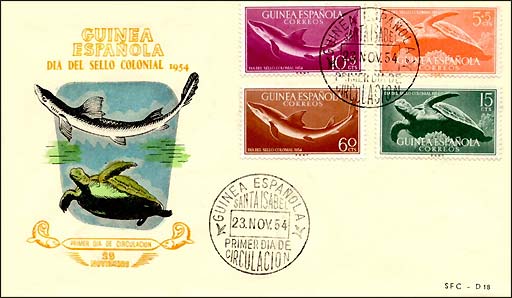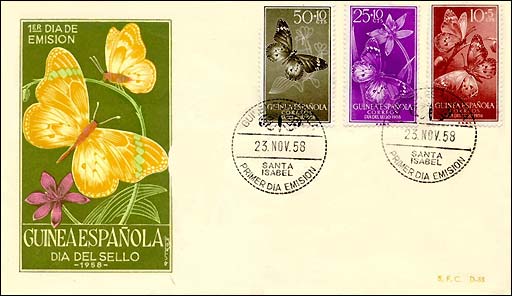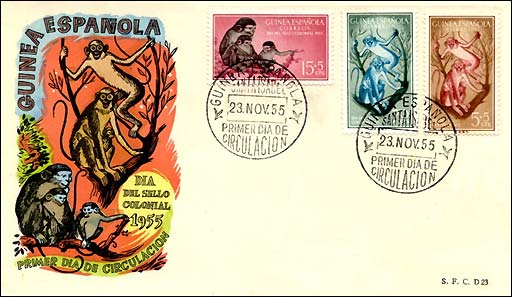|
SPANISH GUINEA
NICE TOPICAL STAMPS - 1
Between 1952 and 1959 the Spanish Guinea has issued some
interesting topical stamps, most of them for the common event of Colonial
Stamp Day. We show below some of them, that were at the time they were
issued in the top in what concerns the quality of the design and of the
printing techniques. This was the reason why they were quite appreciated
worldwide, especially by the young stamp collectors. They were largely
available, at very reasonable prices, and the situation hasn't changed
since, maybe with the exception of FDCs, the postally used being a bit more
difficult to find today.
Please take a look above at the set issued in 1954, Nov 23; Stanley Gibbons
393-394 show a fish named Leptocharias smithi and the Scott 335-336 present
a turtle.

On the cachet of the nice FDC both the fish and the turtle are shown.
The butterflies were issued on Nov. 23, 1948, Sc. B50-52.
From the publicity of the time: "African Butterflies of Spanish Guinea. Here
on the coast fringes of the Guinea Gulf, where Spain has maintained the last
vestiges of her former colonial grandeur, we see disporting themselves in
beds of wild iris winged insects known as "Clouded Yellow Butterflies" that
come in mysteriously from the sea and thrive here because of resemblance to
a Planema species distasteful to insect eating birds.

Note "triple tie-in" of stamps, cachet and pictorial cancel,
all showing butterflies. The first-day city, Santa Isabel (the capital of
Spanish Guinea - V.M.), is named for Spain's dynamic queen, Isabel la
Catolica. Stamps designed by Vicente Domingues Urosas, Teodoro Miciano and
Rafael Losano Prieto. Cachet is color-printed and hand -painted."
The red-eared guenons appeared on stamps on Nov. 23, 1955
(Sc. 343 and B35-6), on Nov. 23, 1957

In my opinion the red-eared
guenons is the most beautiful
of Spanish Guinea topical sets.
The whole set of Spanish Guinea elephants is shown
above.

It was issued on Nov. 23, 1957 (Sc. 348 -
349, B 43 - 44). The cachet looks a bit strange this time.
Credits: many thanks to Tracy Barber
(USA) for scans of entire sets.
Next page Spanish Guinea
|